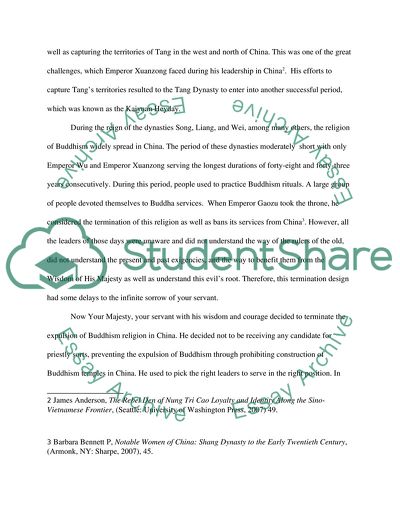Cite this document
(Emperor of Tang Dynasty: Memorial of Emperor Xuanzong Essay Example | Topics and Well Written Essays - 1750 words, n.d.)
Emperor of Tang Dynasty: Memorial of Emperor Xuanzong Essay Example | Topics and Well Written Essays - 1750 words. https://studentshare.org/history/1823959-memorial-to-the-emperor-xuanzong-from-the-scholars-perspective-detailing-reasons-for-the-expulsion-of-buddhism-from-china
Emperor of Tang Dynasty: Memorial of Emperor Xuanzong Essay Example | Topics and Well Written Essays - 1750 words. https://studentshare.org/history/1823959-memorial-to-the-emperor-xuanzong-from-the-scholars-perspective-detailing-reasons-for-the-expulsion-of-buddhism-from-china
(Emperor of Tang Dynasty: Memorial of Emperor Xuanzong Essay Example | Topics and Well Written Essays - 1750 Words)
Emperor of Tang Dynasty: Memorial of Emperor Xuanzong Essay Example | Topics and Well Written Essays - 1750 Words. https://studentshare.org/history/1823959-memorial-to-the-emperor-xuanzong-from-the-scholars-perspective-detailing-reasons-for-the-expulsion-of-buddhism-from-china.
Emperor of Tang Dynasty: Memorial of Emperor Xuanzong Essay Example | Topics and Well Written Essays - 1750 Words. https://studentshare.org/history/1823959-memorial-to-the-emperor-xuanzong-from-the-scholars-perspective-detailing-reasons-for-the-expulsion-of-buddhism-from-china.
“Emperor of Tang Dynasty: Memorial of Emperor Xuanzong Essay Example | Topics and Well Written Essays - 1750 Words”. https://studentshare.org/history/1823959-memorial-to-the-emperor-xuanzong-from-the-scholars-perspective-detailing-reasons-for-the-expulsion-of-buddhism-from-china.


